Ditapis dengan
E-book State of Empowerment : Low-Income Families and the New Welfare State
At around 3:00 on weekday afternoons, dismissal bells ring at thousands of schools across the country. For millions of students, these bells signal not just the end of the school day but also the beginning of another important educa-tional activity: federally funded after-school programs offering tutoring, homework help, and basic supervision.At Jackson Elementary1 in Chicago, the end o…
- Edisi
- -
- ISBN/ISSN
- 9780472131648
- Deskripsi Fisik
- 179 hlm
- Judul Seri
- -
- No. Panggil
- 320 BAR s
E-book In a Wounded Land : Conservation, Extraction, and Human Well-Being in …
TANGANYIKA (TANZANIA SINCE 1964) was part of German East Africa from 1885 to 1918. It became a British League of Nations mandate between 1922 and 1946 and a British United Nations Trusteeship Terri-tory between 1946 and 1961. On December 9, 1961, Tanganyika gained independence from the British, and in 1964 it merged with Zanzibar, a former British protectora…
- Edisi
- -
- ISBN/ISSN
- 9780816553099
- Deskripsi Fisik
- 373 hlm
- Judul Seri
- -
- No. Panggil
- 320 KAM i
E-book State Fragility
Fragile states expose their societies to the risk of meltdown or collapse, endangering the lives of their citizens and leaving them unable to sustain ordinary life. When this happens, famine, violent disorder and economic distress can displace many millions of people, with consequent impacts on surrounding regions. State fragility can also threate…
- Edisi
- -
- ISBN/ISSN
- 9781003297697
- Deskripsi Fisik
- 345 hlm
- Judul Seri
- -
- No. Panggil
- 320 BIZ s
E-book Governance Democracy and Development in Latin America and the Carribean
The way in which these six problems interact has far-reaching consequences for the day-to-day conduct of public affairs, the rights and freedoms of citizens and the legitimacy of the democratic system. The assessment points to the economic vulnerability of the lower middle class, due to the fragmentation of the labor market (formalityinformality, low-high productivity) and the segmentation of …
- Edisi
- -
- ISBN/ISSN
- -
- Deskripsi Fisik
- 53 hlm
- Judul Seri
- -
- No. Panggil
- 320.8 CAS g
E-book The Struggle for Abolition : Power and Legitimacy in Multilateral Nucl…
What ought we do about the bomb? The official answer given by effectively all the world’s states is abolition. To be sure, the current nuclear-armed states are for all intents and purposes resolved to retain and renew their arsenals for the foreseeable future. Disarmament rhetoric has persistently been belied by enormous investments in warheads, missiles, bombers, and submarines. Yet, on the …
- Edisi
- -
- ISBN/ISSN
- 9781003456841
- Deskripsi Fisik
- 222 hlm
- Judul Seri
- -
- No. Panggil
- 320 EGE t
E-book Eskalation : G20 in Hamburg, Protest und Gewalt
Am 7. und 8. Juli 2017 versammelten sich in den Hamburger Messehallen Vertreter*innen der reichsten Länder der Welt für das Treffen der Gruppe der 20. Verschiedene Bündnisse und Initiativen riefen zu Protesten gegen das Treffen auf. Organisiert wurde ein vielfältiges Repertoire an Protest-aktionen, das von einem Gegengipfel und Protestcamps über Performan-ces, …
- Edisi
- -
- ISBN/ISSN
- 9783868543735
- Deskripsi Fisik
- 290 hlm
- Judul Seri
- -
- No. Panggil
- 320 MAL e
E-book Do Exclusionary Rules Ensure a Fair Trial? : A Comparative Perspective…
Criminal justice systems are barometers of social development. This claim, putforward by German criminal law scholars,1alludes to the fact that inherent in thecriminal justice process are conflicting interests between the need to ensure comprehensive fact-finding on the one hand, and the wish to safeguard individual rights,especially those of defendants, on the other hand. In all criminal justi…
- Edisi
- -
- ISBN/ISSN
- 9783030125202
- Deskripsi Fisik
- 387 hlm
- Judul Seri
- -
- No. Panggil
- 320 CHE d
E-book Making Sense of the Arab State
For scholars of the Arab world, the state remains an elusive, unsettled, and unsettling presence. Since mandatory and then independent states emerged in the Arab world in the aftermath of World War I, theorizing the Arab state has been a central preoccupation for generations of regional specialists. The gravitational pull of the state is not surprising. As a pr…
- Edisi
- -
- ISBN/ISSN
- 9780472904617
- Deskripsi Fisik
- 309 hlm
- Judul Seri
- -
- No. Panggil
- 320 AND m
E-book The China Alternative : Changing Regional Order in the Pacific Islands
The Pacific Islands region has entered a new period of uncertainty precipitated in large part by the emergence of China as a major regional actor as well as the reaction of more established powers to perceived threats to their longstanding influence. In March 2019, in the wake of a flurry of activity on the part of Australia, New Zealand and the United States …
- Edisi
- -
- ISBN/ISSN
- 9781760464172
- Deskripsi Fisik
- 520 hlm
- Judul Seri
- -
- No. Panggil
- 320 AQO t
E-book China Dreams
According to legend, the Jade Emperor called all twelve celestial animals to his palace to assign them their place in the zodiac. The Pig, a lazy if intelligent creature, was still in dreamland when the other eleven turned up to claim their places. He ended up last. And so 2019, the eventful Year of the Pig (coincidentally also marked by swine fever and a severe pork supply shor…
- Edisi
- -
- ISBN/ISSN
- 9781760463748
- Deskripsi Fisik
- 328 hlm
- Judul Seri
- -
- No. Panggil
- 320 GOL c
E-book International Aid and Urban Change : Humanitarian Presence in Bamako, …
This work is the result of research started in 2014, on the processes of urban transformations in Bamako Juba, Nairobi and Abidjan in relation to the pres-ence and security policies of UN missions and international aid. The results of this research highlight an uneven process of territoriality where humanitarian organisations operate.The focus of this work or…
- Edisi
- -
- ISBN/ISSN
- 9783034345620
- Deskripsi Fisik
- 366 hlm
- Judul Seri
- -
- No. Panggil
- 320 DER i
E-book Come Hell or High Fever : Readying the World's Megacities for Disaster
Haruki Akamatsu had not felt the ocean crust heave 10 metres upward. He was not there to see the 6-metre tsunami surge inland, drowning thousands and clawing the earth bare with its retreat. He had, however, clutched the carpet beneath his desk as the twenty-first-floor office in Tokyo swayed sickeningly, thinking the worst was over when the swaying stopped. It was not, b…
- Edisi
- -
- ISBN/ISSN
- 9781760465544
- Deskripsi Fisik
- 499 hlm
- Judul Seri
- -
- No. Panggil
- 320 GLE c
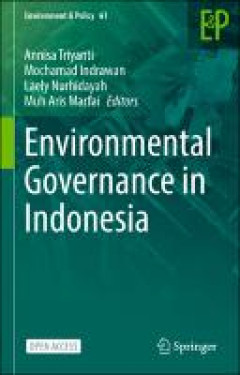
E-book Environmental Governance in Indonesia
This open access book presents the state-of-the-art environmental governance research and practices in Indonesia. It offers a wide scope, covering different sectors (e.g., forestry, mining) and geographical landscapes (e.g., inland and coastal areas). This book engages with existing theories and frameworks, including Earth System Governance, Adaptive and Interactive Governance, among others to …
- Edisi
- -
- ISBN/ISSN
- 9783031159046
- Deskripsi Fisik
- 513 halaman
- Judul Seri
- -
- No. Panggil
- 320 TRI e

E-book Baby Ninth Amendments : How Americans Embraced Unenumerated Rights and…
Take an average American. We will call her “Jane.” Think about what she may have done yesterday.Jane rose at a time best suited to her schedule for the day so she could walk her dog, get the kids breakfast and off to school, or get to work. Or maybe she was lucky enough to sleep in.She ate a breakfast that conformed to her cravings, or health needs, or budget.She got ready, choosing clothes…
- Edisi
- -
- ISBN/ISSN
- 9780472903498
- Deskripsi Fisik
- 215 hlm
- Judul Seri
- -
- No. Panggil
- 320 SAN b
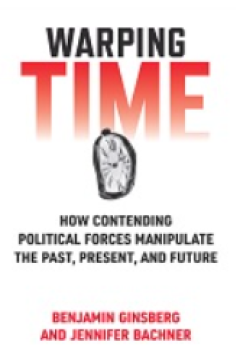
E-book Warping Time : How Contending Political Forces Manipulate the Past, Pr…
In a 2017 speech, Virginia governor Terry McAuliffe declared that the Confederate monuments should be removed because they helped to keep racism alive in present-day institutions and attitudes. President Donald Trump, for his part, argued that those attempting to remove the monu-ments were seeking to rewrite history in order to remove all traces of ideas with whi…
- Edisi
- -
- ISBN/ISSN
- 9780472903344
- Deskripsi Fisik
- 159 hlm
- Judul Seri
- -
- No. Panggil
- 320 GIN w
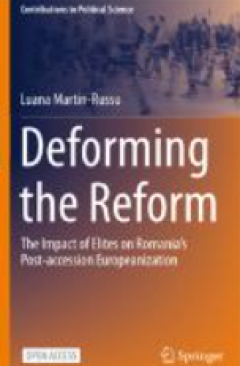
E-book Deforming the Reform : The Impact of Elites on Romania’s Post-access…
On 1 January 2007, Romania became a full member of the European Union. Thestatethat joined the EU was already since 1991 a constitutional republic with abicameral Parliament elected by popular vote and with a dual executive formed by adirectly elected president and an appointed prime minister. In the lead-up to itsaccession, Romania had to amend and adopt numerous laws in order to bring themint…
- Edisi
- -
- ISBN/ISSN
- 9783031110818
- Deskripsi Fisik
- 224 hlm
- Judul Seri
- -
- No. Panggil
- 320 MAR d
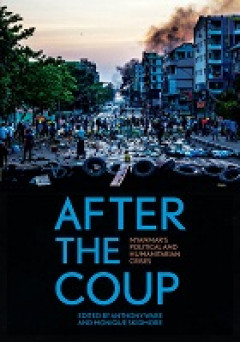
E-book After the Coup: Myanmar's Political and Humanitarian Crises
The coup in Myanmar on 1 February 2021 abruptly reversed a decade-long flirtation with economic and political freedoms. The country has since descended into civil war, the people have been plunged back into conflict and poverty, and the state is again characterised by fragility and human insecurity. As the Myanmar people oppose the regime and fight for their rights, the international community …
- Edisi
- -
- ISBN/ISSN
- 9781760466145
- Deskripsi Fisik
- 348 halaman
- Judul Seri
- -
- No. Panggil
- 320 SKI a
E-book Mobilizing the Metropolis : How the Port Authority Built New York
A remarkable structure sits on the west side of Manhattan. Although 111 Eighth Avenue is only eighteen floors high, it consumes an entire massive New York City block and was built with big things in mind. The building (see fig. 1.1), which contains 50 percent more square feet than the Empire State Building, was designed with elevators so large …
- Edisi
- -
- ISBN/ISSN
- 9780472903481
- Deskripsi Fisik
- 387 hlm
- Judul Seri
- -
- No. Panggil
- 320 PLO m
E-book Whatever Happened to Tory Liverpool? : Success, Decline and Irrelevanc…
In the municipal election of 1968, the Liverpool Conservatives won 62 per cent of the vote and 78 per cent of the seats on Liverpool City Council. Moreover, they had run Liverpool’s municipal government for 86 of the previous 100 years. In 1972 they lost control of the council. In 1983 they lost their last two MPs, and in 1998 they lost their final counci…
- Edisi
- -
- ISBN/ISSN
- 9781802078480
- Deskripsi Fisik
- 296 hlm
- Judul Seri
- -
- No. Panggil
- 320.41 JEF w
E-book 100 Jahre Politikwissenschaft in Hamburg : Bruchstücke zu einer Insti…
Als Siegfried Landshut im Februar 1950 zwei Gastvorträge im Hauptgebäude derUniversitätHamburghielt,kehrteererstmalsandenOrtzurück,vondemerknapp17 Jahre zuvor als Jude vertrieben worden war.1Zum Sommersemester 1951 erhielter dann den neu eingerichteten Lehrstuhl für die »Wissenschaft von der Politik«,einen der ersten seiner Art in der Bundesrepublik. An der Etablierung der Poli-tikwissen…
- Edisi
- -
- ISBN/ISSN
- 9783839453346
- Deskripsi Fisik
- 383 hlm
- Judul Seri
- -
- No. Panggil
- 320.43 NIE e
E-book Arctic Governance : Power in Cross-Border Cooperation
From the days of the Greek cartographers dreaming about Ultima Thule at the edges of the known world, the cold reaches of the northern hemi-sphere have inspired grandiose caricatures of risk and opportunity. The region is often imagined from a distance as sublime, exceptional and prone to extremes. Out of space and out of time, as Poe put it, the cir-cumpolar North is frequently …
- Edisi
- -
- ISBN/ISSN
- 9781526131645
- Deskripsi Fisik
- 178 hlm
- Judul Seri
- -
- No. Panggil
- 320 ROW a
E-book Debating the War in Ukraine : Counterfactual Histories and Future Poss…
In history, there are both periods of relative stability and critical nodal points, when specific turns of events and choices have an impact on which path the next phase of history will take (for the concept of nodal point, see Bhaskar 1986, 217 and Patomäki 2006, 9–18; for world-historical examples of counterfactual turning points, see Tetlock et al. 2006). A r…
- Edisi
- -
- ISBN/ISSN
- 9781003375326
- Deskripsi Fisik
- 111 hlm
- Judul Seri
- -
- No. Panggil
- 320 FOR d
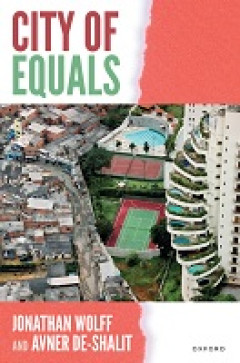
E-Book City of Equals
When we think about equality in the city, we are very likely to think first of the wide and growing divide between rich and poor, in material terms. Yet when we think more about a 'city of equals' it becomes apparent that how people feel treated by the city and those around them, and whether they can live according to their values, are much more central. Accordingly, combining their own reflect…
- Edisi
- -
- ISBN/ISSN
- 9780198894735
- Deskripsi Fisik
- 225 halaman
- Judul Seri
- -
- No. Panggil
- 320 WOL c
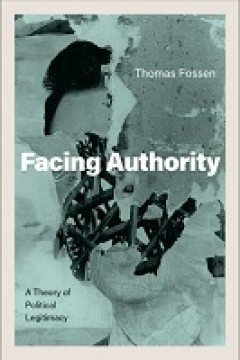
E-Book Facing Authority: A Theory of Political Legitimacy
When your friends call on you to take to the streets and demand the fall of the regime, this presses a practical predicament that we all address, often implicitly, in our everyday lives: Is this regime legitimate? Facing Authority investigates the ways in which this question of legitimacy can be addressed in theory and practice, in the face of disagreement and uncertainty. Instead of asking, �…
- Edisi
- -
- ISBN/ISSN
- 9780197645703
- Deskripsi Fisik
- 233 halaman
- Judul Seri
- -
- No. Panggil
- 320 FOS f
E-book The Asian 21st Century
e live in hugely paradoxical times. We will see greater change in the twenty-firstcentury than we have in any previous human century. Huge leaps in science andtechnology, accompanied by huge economic and social advances in many societiesaround the world, especially Asian societies, will mean that the texture and chem-istry of the twenty-first century will be massively different from the ninetee…
- Edisi
- -
- ISBN/ISSN
- 9789811668111
- Deskripsi Fisik
- 250 hlm
- Judul Seri
- -
- No. Panggil
- 320 MAH t
 Karya Umum
Karya Umum  Filsafat
Filsafat  Agama
Agama  Ilmu-ilmu Sosial
Ilmu-ilmu Sosial  Bahasa
Bahasa  Ilmu-ilmu Murni
Ilmu-ilmu Murni  Ilmu-ilmu Terapan
Ilmu-ilmu Terapan  Kesenian, Hiburan, dan Olahraga
Kesenian, Hiburan, dan Olahraga  Kesusastraan
Kesusastraan  Geografi dan Sejarah
Geografi dan Sejarah